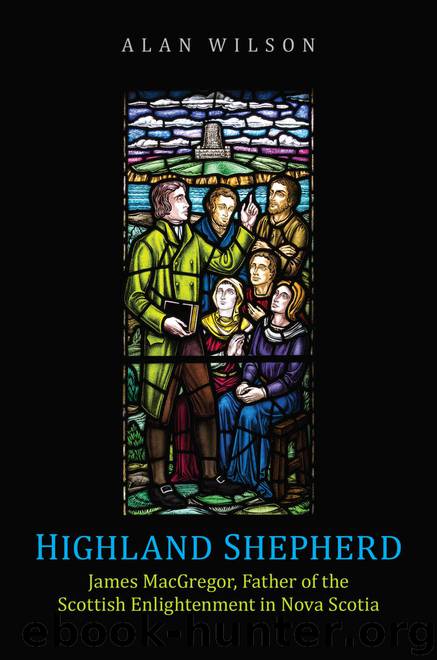Highland Shepherd: James MacGregor, Father of the Scottish Enlightenment in Nova Scotia by Alan Wilson

Author:Alan Wilson [Wilson, Alan]
Language: eng
Format: azw
Publisher: University of Toronto Press, Scholarly Publishing Division
Published: 2015-08-09T16:00:00+00:00
The “Essay” is a typically optimistic product of the Glasgow Enlightenment, speaking to improvers of all sorts and affirming a bright future for the New World. Thus James’s mind ranged from the East River to the cosmos, and as the ever competent Ann ran her household of increasing numbers of children, he prepared for further missions and causes.
In 1802–3, he was reinforced by the arrival of two more associates: Rev. Alexander Dick and Rev. Thomas McCulloch, both married men.15 Dick, another Perthshire man, born in 1771, had been a weaver, a skilled carpenter, and a cabinet-maker when he had read James’s “Letter of 1793” and resolved to join him. He came from “better than comfortable circumstances … [and was] of more than ordinary mental ability.”16 His father, scion of a formerly Dutch Huguenot family (“Dyck”), was a linen manufacturer. Alex Dick had been much moved by James’s letter, and after a crash course in Latin, he entered Glasgow University and later studied under Archibald Bruce at Whitburn.
Some recent writers have contended that McCulloch “almost singlehandedly” brought science – along with the Academy – to Pictou.17 But following Edinburgh and the example of his acclaimed astronomer/uncle, Rev. Thomas Dick, Alex Dick advocated mechanics’ institutes and in the Enlightenment spirit the alignment of science and spirituality in the curriculum – a goal pursued no less by Dissenters than by Kirk Moderates.18 The prospect of scientific education at Pictou did not await McCulloch’s coming, for MacGregor had long been an advocate and had been engaged in it, Ross was an inventive agronomist, and Dick shared in it by training and family background. But for Dick’s tragically early death he might have rivalled McCulloch as an advocate of the further development of education, science, and religion in Nova Scotia.
Chalmers Jack remarks that one of McCulloch’s and Dick’s greatest assets was that each was married to “one of a family … destined to manse life.”19 The dedicated, energetic Ann Eadie Dick was one of three sisters in a distinguished Secessionist family, all of whom were married to Secessionist ministers, while their three brothers were all Anti-Burgher clergy. Like Alex, Ann came from comfort and education, and she and Dick appear to have enjoyed a modest independence, which relieved them of some of the anxieties common on a frontier stipend.
Dick was licensed to preach by Perth Presbytery in 1802 and at his own request was immediately appointed to Pictou. They sailed for Halifax in June, and after a brief stay in Halifax, Dick was ordained and inducted by MacGregor, Ross, and Brown at Maitland in the vast Douglas district – the first ordination in British North America by a properly constituted, permanent presbytery.
Dick threw himself into the mission, as Patterson attests, “brimful of his burning enthusiasm.” Like the young James, his early sermons were fully written out, “terse in style, his illustrations fresh and striking, and his appeals personal and pointed.”20 Later, he came to preach as spontaneously as James, being filled with the Gospel spirit and recognized as the most eagerly followed preacher after James himself.
Download
This site does not store any files on its server. We only index and link to content provided by other sites. Please contact the content providers to delete copyright contents if any and email us, we'll remove relevant links or contents immediately.
Fanny Burney by Claire Harman(26602)
Empire of the Sikhs by Patwant Singh(23085)
Out of India by Michael Foss(16853)
Leonardo da Vinci by Walter Isaacson(13336)
Small Great Things by Jodi Picoult(7141)
The Six Wives Of Henry VIII (WOMEN IN HISTORY) by Fraser Antonia(5515)
The Wind in My Hair by Masih Alinejad(5095)
A Higher Loyalty: Truth, Lies, and Leadership by James Comey(4964)
The Crown by Robert Lacey(4817)
The Lonely City by Olivia Laing(4802)
Millionaire: The Philanderer, Gambler, and Duelist Who Invented Modern Finance by Janet Gleeson(4478)
The Iron Duke by The Iron Duke(4356)
Papillon (English) by Henri Charrière(4274)
Sticky Fingers by Joe Hagan(4198)
Joan of Arc by Mary Gordon(4110)
Alive: The Story of the Andes Survivors by Piers Paul Read(4031)
Stalin by Stephen Kotkin(3965)
Aleister Crowley: The Biography by Tobias Churton(3640)
Ants Among Elephants by Sujatha Gidla(3467)
